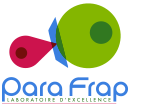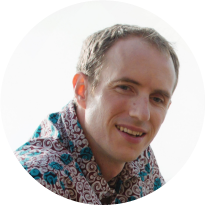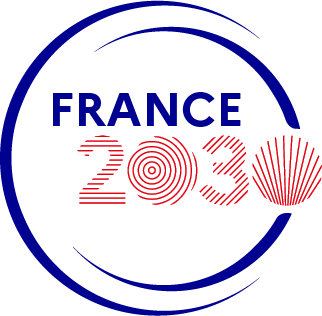

 |
Antoine CLAESSENS |
|
|
Information |
||
| Laboratory of Pathogen Host Interactions | ||
| GATAC-Malaria | ||
| Montpellier | ||
| 0000-0002-4277-0914 | ||
| This email address is being protected from spambots. You need JavaScript enabled to view it. | ||
| https://lphi.umontpellier.fr/en/lphi-teams/genomic-approaches-to-asymptomatic-chronic-malaria | ||
| @Ant1_Claessens | ||
|
Scientific interests and projects |
||
|
How is the malaria parasite Plasmodium falciparum able to establish a chronic, asymptomatic infection in a human host? The GATAC-Malaria team is addressing this question using blood isolates collected in the field and Next Generation Sequencing technology. The objectives of our team are to decipher cellular and molecular features related to two essential parasitic functions: host cell invasion and intracellular replication, with the aim of identifying novel therapeutic strategies. Our research is mainly focused on T. gondii, which is a relevant model for many features conserved throughout the phylum. We then extend our important discoveries to the malaria parasite. We use a broad array of cell biological and biochemical approaches, as well as cutting-edge molecular genetics and genome editing. A major challenge for any malaria elimination campaign is Plasmodium falciparum asymptomatic infections, the hidden infectious reservoir. Nevertheless, these infections can provide useful information on the host-pathogen interactions over an extended period of time. Our lab strive to understand how P. falciparum parasites can survive in human chronic infections over the 6-month long dry season, using an already available collection of blood samples from a cohort of asymptomatic volunteers in The Gambia. To explore how the parasite senses its environment and adapt to it, we measure the parasite multiplication rate and sequence its transcriptome. Our novel protocol can sequence a whole transcriptome from as few as 1000 parasites. We will identify genes associated with seasonality using dry and wet season samples from The Gambia. In parallel, we focus on parasite antigenic variation by analyzing the dynamicity of the var gene transcription pattern. In summary, we will advance our understanding of the parasite biology and discover key molecular drivers of asymptomatic infections, a critical step to enable the eradication of malaria. |
||
|
Top 5 publications of the last 5 years |
||
|
1. Claessens A, Adams Y, Ghumra A, Lindergard G, … Bozdech Z and Rowe JA (2012). Group A-like PfEMP1s mediate cytoadherence to human brain endothelial cells. Proc Natl Acad Sci USA. doi: 10.1073/pnas.1120461109 2. Claessens A, Hamilton W, Kekre M, Otto T, Faizullabhoy A, Rayner J, Kwiatkowski D (2014). Generation of antigenic diversity in Plasmodium falciparum by structured rearrangement of var genes during mitosis. PLoS Genetics. doi:10.1371/journal.pgen.1004812 3. Claessens A, Hamilton W, Otto T, Kekre M, Fairhurst R, Rayner J, Kwiatkowski D (2016). Extreme mutation bias and high AT content in Plasmodium falciparum. Nucleic Acid Research. doi: 10.1093/nar/gkw1259 4. Claessens A, Affara M, Assefa S, Kwiatkowski D & Conway D (2017). Culture adaptation of malaria parasites selects for convergent loss-of-function mutants. Scientific Reports. Joint corresponding author. doi: 10.1038/srep41303 5. Claessens A, Harris LM, Stanojcic S, Chappell L, Stanton A, Kuk N, et al. (2018) RecQ helicases in the malaria parasite Plasmodium falciparum affect genome stability, gene expression patterns and DNA replication dynamics. PLoS Genetics. doi: 10.1371/journal.pgen.1007490 |
||
The INSERM workshop “Modern methods in molecular parasitology” will take place in Montpellier, France, from 4–6 November 2026. This event will bring together leading experts in...
The 15th CAPF (French Anti-Parasitic and Anti-Fungal Consortium) workshop will take place on 16–17 March 2026 in Strasbourg (France). This event is an excellent opportunity for students and postdoctoral researchers to participate and contribute...
Call for Applications: New Junior Research Groups at Institut Pasteur The Institut Pasteur has launched an international call to recruit new junior group leaders.This is a unique opportunity for high-potential scientists to...
JOB : Ingénieur·e d’étude / Research Engineer – Mosquito Immunity (IBMC, Strasbourg) 🇫🇷 Le laboratoire Mosquito Immune Responses recrute un·e ingénieur·e d’étude à l’IBMC (Strasbourg). La personne recrutée sera en...
Applications are now open for the 2026 Biology of Parasitism (BoP) course, taking place June 12–July 23, 2026 at the Marine Biological Laboratory in Woods Hole, MA.This intensive 6-week program offers PhD students and postdocs advanced training in...
Newcastle University offers a full-time, fixed-term position (3 years) for a Research Assistant or Research Associate in Molecular Parasitology — funded by the Medical Research Council (MRC). About the Opportunity Location:...
Multidisciplinary PhD opportunity in the fields of infectious diseases, gene regulations and molecular signalisation. Fully Funded 4-Year PhD at the University of York A fully funded PhD opportunity is available at the...
The EMBO Workshop 2025 “Host–Parasite Relationship: From Mechanisms to Control Strategies”, took place from October 5–8, 2025, on the beautiful Île des Embiez (France). Organized within the framework of the LabEx ParaFrap and...
Postdoc (M/F) in molecular and biochemical parasitology (Toxoplasma gondii) A 24-month post-doctoral position starting on January 2026 and funded by the French National Research Agency (ANR) is available in the in the...
Postdoc (M/F) Molecular and cell biology in Trypanosoma brucei A 24-month post-doctoral position starting on November 1st 2025 (or before) and funded by the French National Research Agency (ANR) is available in the...

© 2023. All rights reserved MLCOM
Notre site LabEx ParaFrap utilise des cookies pour réaliser des statistiques de visites, partager des contenus sur les réseaux sociaux et améliorer votre expérience. En refusant les cookies, certains services seront amenés à ne pas fonctionner correctement. Nous conservons votre choix pendant 30 jours. Vous pouvez changer d'avis en cliquant sur le bouton 'Cookies' en bas à gauche de chaque page de notre site. En savoir plus
Ce site utilise des cookies pour assurer son bon fonctionnement et ne peuvent pas être désactivés de nos systèmes. Nous ne les utilisons pas à des fins publicitaires. Si ces cookies sont bloqués, certaines parties du site ne pourront pas fonctionner.
Ce site utilise des cookies de mesure et d’analyse d’audience, tels que Google Analytics et Google Ads, afin d’évaluer et d’améliorer notre site internet.
Ce site utilise des composants tiers, tels que NotAllowedScript698ea115813f5ReCAPTCHA, Google NotAllowedScript698ea11581096Maps, MailChimp ou Calameo, qui peuvent déposer des cookies sur votre machine. Si vous décider de bloquer un composant, le contenu ne s’affichera pas
Des plug-ins de réseaux sociaux et de vidéos, qui exploitent des cookies, sont présents sur ce site web. Ils permettent d’améliorer la convivialité et la promotion du site grâce à différentes interactions sociales.
Ce site web utilise un certain nombre de cookies pour gérer, par exemple, les sessions utilisateurs.

